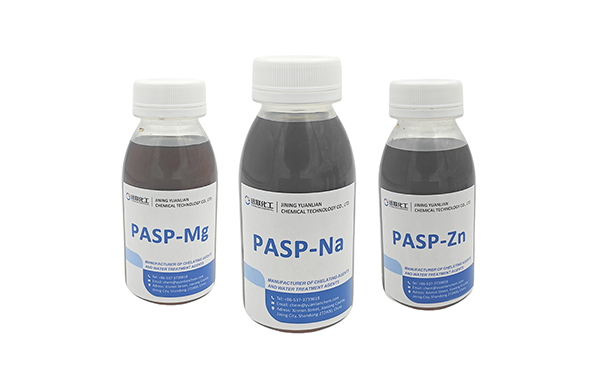
Polyaspartic Acid (PASP): A Complete Guide to Its Application as a High-Performance, Phosphorus-Free
In the pursuit of sustainable industrial practices within the European Green Deal framework, Polyaspartic Acid (PASP) stands out as a benchmark for green chemistry, combining proven efficacy with ultimate biodegradability in water treatment.
The drive towards zero-pollutant discharge in sensitive ecosystems, such as the Baltic Sea or the Rhine River, demands innovative solutions. Polyaspartic Acid (PASP), a synthetic polymer inspired by natural proteins, answers this call. It offers a completely phosphorus-free and non-toxic profile, effectively breaking down into harmless components after use. This makes it a preferred choice for industries aiming to meet stringent EU regulations like REACH and to achieve their corporate sustainability targets.
This article delves into the unique properties, working mechanisms, and practical application of PASP for effective and environmentally sound scale and corrosion control.

01 Environmental Advantages and Technical Profile of PASP
PASP is synthesized to mimic natural substances, giving it an exceptional environmental profile. Its peptide-like backbone allows microorganisms to recognize and degrade it completely, with biodegradation rates often exceeding 90%.
Key Environmental Advantages:
-
Phosphorus-Free: Eliminates the risk of eutrophication in receiving water bodies.
-
Readily Biodegradable: Meets the criteria for environmentally acceptable lubricants and chemicals under OECD standards, aligning with EU policies.
-
Safe and Non-Bioaccumulative: Its breakdown products are benign, posing no long-term risk to the environment.
Outstanding Technical Characteristics:
-
Excellent Scale Inhibition: Highly effective against common scales like calcium carbonate and calcium sulphate through potent threshold inhibition and dispersion.
-
High Calcium Tolerance: Maintains stability and performance even in hard water conditions typical in parts of the UK, Germany, and France, allowing for high cycles of concentration.
-
Multifunctional Performance: Provides not only scale control but also a measurable corrosion-inhibiting effect on carbon steel.
02 Mechanism of Action: How PASP Prevents Scale and Corrosion?
1. Scale Inhibition: Dispersion and Crystal Modification
PASP's molecular chain contains numerous carboxylate groups that perform two key functions:
-
Dispersion: The polymer adsorbs onto microscopic scale crystals, imparting a negative charge that causes them to repel each other, keeping them suspended in the water flow.
-
Crystal Distortion: It integrates into the crystal lattice of forming scale (e.g., calcite), disrupting its regular structure. This results in soft, non-adherent crystals that are easily washed away.
2. Corrosion Inhibition: Formation of a Protective Layer
PASP mitigates corrosion by adsorbing onto metal surfaces (e.g., carbon steel) via its functional groups. This forms a protective molecular film that acts as a barrier, hindering the diffusion of oxygen and corrosive ions like chlorides to the metal surface, thereby reducing the corrosion rate.
03 Practical Application and Dosing Guidelines for European Operations
PASP is versatile and can be used as a standalone treatment or as a key component in formulated products.
Typical Application Scenarios:
-
Industrial Cooling Water Systems: Ideal for systems operating at high cycles of concentration, especially in regions with hard water.
-
Reverse Osmosis (RO) Systems: Used as an effective antiscalant to protect membranes from scaling, enhancing efficiency and lifespan.
-
Oil & Gas (Produced Water): Prevents barium sulphate and strontium sulphate scaling in injection systems.
Recommended Dosing Parameters:
| Application System | Suggested Dose | pH Range | Key Consideration |
|---|---|---|---|
| Recirculating Cooling Water | 2 - 10 ppm | 7.5 - 9.5 | Dose depends on hardness, alkalinity, and cycles of concentration. A water analysis is essential. |
| Reverse Osmosis (RO) Systems | 1 - 5 ppm | 5.0 - 8.0 | Ensure compatibility with specific membrane types; pilot testing is recommended. |
| As a Formulation Component | Varies | Varies | Often blended with complementary inhibitors like molybdates for enhanced corrosion protection. |
Feeding Method: Continuous injection using a metering pump into the suction side of the system's recirculation pump is recommended for even distribution.
04 Case in Point: Successful Implementation in a Chemical Plant in Antwerp
Challenge: A chemical plant in the Port of Antwerp faced strict effluent limits on phosphorus. Their existing phosphonate-based program caused compliance issues and promoted microbial growth in the cooling system.
Solution:
-
Product Switch: Transitioned to a treatment program based on Polyaspartic Acid (PASP).
-
Optimisation: The initial dose was set at 8 ppm and subsequently optimised to 6 ppm based on real-time monitoring of water parameters.
-
Integrated Approach: Supported by a tailored microbial control program.
Results:
-
Environmental Compliance: Effluent phosphorus was reduced to non-detectable levels, ensuring full compliance with Flemish environmental regulations.
-
Operational Efficiency: Heat exchange efficiency was maintained, and microbial control improved, leading to a 15% reduction in biocide usage.
-
Asset Protection: Corrosion rates remained well below the 0.075 mm/year benchmark, ensuring long-term equipment integrity.
Conclusion
Polyaspartic Acid (PASP) represents a pinnacle of sustainable innovation in water treatment. It successfully bridges the gap between uncompromising environmental responsibility and demanding industrial performance requirements, making it a cornerstone technology for the future of water management in Europe.
Yuanlian Chemical specializes in the production of polyaspartic acid (PASP),tetrasodium iminodisuccinate(IDS), GLDA, MGDA etc. with stable quality and excellent quantity!





Contact us